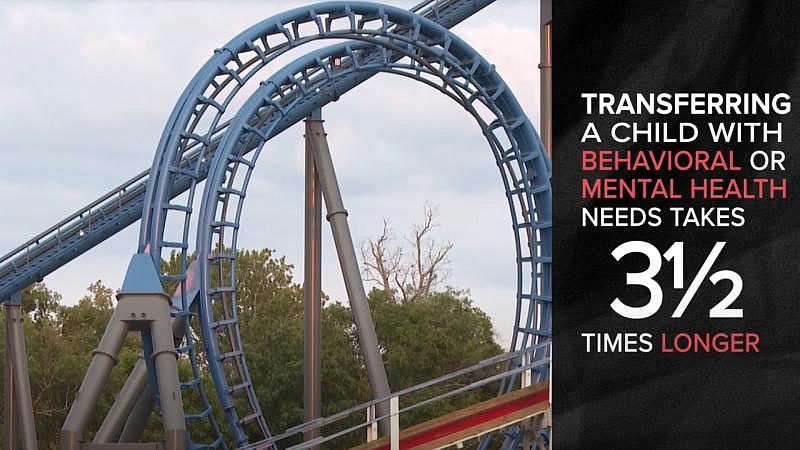'Dirty little secret' | Georgia mom angry after state forces her to trade custody of her son for his mental health treatment
This story was produced as part of a project for the 2020 Data Fellowship, a program of the USC Annenberg Center for Health Journalism.
Other stories by Rebecca Lindstrom include:
Georgia Families Struggling With Access To Mental Healthcare Will Soon See Changes
Georgia lawmakers commit to tackling child abandonment in next legislative session
Sexual exploitation, just one more danger to a mental health crisis
Broken furniture, broken hopes: Georgia mom stuck in loop trying to get help for son with autism
Teen finds team to score touchdown in life: How new DFCS program could prevent child abandonment
Mom says she left note with abandoned child, police never found it
Homeless. Jail. Sexually exploited. The Game of Life never talked about this.
'I don't want to hurt nobody' | Woman with autism confronted by police

11 Alive
It’s not a ranking to be proud of. According to Mental Health America, Georgia ranks 51, the absolute last in the nation when it comes to access to mental health care.
The Austin family is living the reality of what that ranking means. Earlier this year, they agreed to give up custody of their son Jacob, in exchange for the residential behavioral therapy he needs.
JACOB'S STORYThat’s a tough concept for Jacob, a 16-year-old who doesn’t know what to do with his emotions but does know he loves his parents, Amy and Chad. He also needs to know ‘he’ is loved too. His mother remembers the phone call when she had to share the news with Jacob.
“He broke down completely. He sobbed. He cried and cried and cried. And he said, ‘does this mean you don’t want me anymore?’”
The ironic part, Chad Austin works for a metro school district, so his family has insurance through the state’s health care plan. When that failed to meet Jacob’s needs, state employees guided the family on how to give up custody so his care could be paid for by– the state.
Everyone but the insurance company acknowledged Jacob’s need for treatment. But to get it, they had to shift custody– to shift who would foot the bill.
“If the money is there, why are we forcing parents to give up custody?” Amy asked.
Jacob is now in southwest Georgia at a group home, his care controlled by Georgia’s Division of Family and Children Services. His parents say there’s really only one reason why– mental health parity.
“You get those hidden disabilities, the ones you can’t see, the poor executive function skills, the ADHD, the autism… you do have to fight harder to get coverage I feel for those,” Amy Austin said. “Yeah, if he had cancer or diabetes, we’d be down at CHOA getting top-notch medical care for as long as he needed.”
The Austins know a lot about health insurance. Their son has been in therapy since he was a toddler– occupational, speech, and behavioral.
“You have to call the insurance company first and getting a code that says it's okay. And then you get 20 visits,” they explained. “And hopefully you’re fine at the end of those 20 visits.”
If not, you call back and hope the insurance company will give you more. Often the Austins say they heard no, so they paid for treatments like ABA, Applied Behavioral Analysis, out of their own pocket.
Amy, herself, is a children’s occupational therapist. She works all day with children who have intense needs. But that didn’t make navigating the system any easier.
Jacob has attended 11 schools in 10 years and always seems ready for a fight. Even at home, his parents have called 911 a few times.
“He’s breaking things outside and he’s trying to break down the door,” you can hear his father tell dispatch.
It’s not that the Austins feared for their safety, but they did hope the police presence would calm Jacob and make him realize the seriousness of his actions.
That didn’t help either.
IT'S HARD TO IGNORE THE DATA“The burden of behavioral and mental health conditions in children and adolescence are significant and they’re growing,” Dr. Daniel Salinas with Children’s Healthcare of Atlanta said.
Since 2017, the number of children coming to Children’s emergency department with a behavioral mental health concern has shot up 133-percent. According to a hospital spokesperson, the top reasons are suicide/self-injury, impulse control or conduct disorders, mental health symptoms, and depressive disorders.
That trend triggered the hospital to study its system of care and figure out how it could treat children holistically. That means taking the time to determine if a medical condition is triggered by an environmental or mental health cause. It also means reinforcing relationships in the community to provide better access.
While Children's is trained to de-escalate a mental health crisis, it doesn’t provide long-term care. The hospital’s data shows transferring a child with a behavioral or mental health need takes three-and-a-half times longer than transferring one with a medical problem like severe burns.
Credit: 11Alive
It sees the biggest delay in finding placement for teens, often with autism, who have severe anxiety or aggressive behavioral problems.
“Sometimes it has to do with the age of the child. There’s not a bed available for a 7-year-old child at a psychiatric facility. Sometimes it has to do with their condition…. because they don’t have the special expertise. But developing that expertise in those facilities sometimes comes down to parity. Because they’re not reimbursed the same way as if they were a burn hospital receiving a child for burn care for example,” Dr. Salinas said.
Just as frustrating, of the patients transferred to a psychiatric setting– more than 10-percent last year end up back in the ER with another mental health crisis within 30 days.
“We’re working on developing the story behind each of these kids so that we can get together with all the stakeholders– the insurance companies, the state government and others, and really get a deep understanding of where are the failure points, if any, that caused a child to be in our emergency room six times in a year for the same issue,” Dr. Salinas explained.
MENTAL HEALTH PARITY PROBLEMS“When you say mental health parity, people's eyes kind of glaze over,” Eve Byrd admits, the executive director of the mental health program at the Carter Center.
She says not all insurance companies are required to provide coverage for mental health. But if they do, they must provide it at the same level as physical care. And in the case of Medicaid, access to care for children and youths is a mandate. A mandate Byrd says the state of Georiga, and many others are not meeting.
“No, we're not meeting that mandate…. We have no transparency and we’re not enforcing it.”
But the Departments of Community Health and Insurance, the two-state agencies responsible for making sure that we do enforce it, say they don’t receive many complaints.
Byrd believes people simply don’t know they should expect more and when they don’t get it, that they can complain.
“We know that people continue to have to pay much more out of pocket for their mental health treatment. We know that people are unable to get or identify providers,” Byrd explained.
The Austins say they did try to complain, first to the Georgia Department of Insurance. They were directed to DCH since that’s the department that manages the state insurance contract. Chad Austin says he was stunned by DCH’s response.
“Basically, call your insurance company. They have oversight over themselves,” he said. “So there’s nobody to complain to,” Amy added to punctuate the point.
At least 10 states this past year have passed legislation to tackle mental health parity. Supporters hope Georgia will do the same next session.
The Georgia Parity Collaborative and Behavioral Health and Innovation Commission, a mix of Representatives, Senators, and industry experts, spent months studying gaps in our mental health services. They both determined the state must hold private and public health insurance companies accountable for parity if we’re ever going to stop children cycling in and out of care.
“If we can work on access together, we can make a big difference. I am hopeful. I am not naïve, but I am hopeful,” Dr. Salinas said.
In the meantime, the Carter Center is asking anyone who feels they have been unfairly denied coverage to file a complaint and share their story.
“There were more than one thousand Georgia children whose parents had to give up their flesh and blood and the love of their life to get the care that they needed. That is so wrong. We have the knowledge. We have the resources in this country to help these families and these children,” Byrd said.
There’s evidence the problem is getting worse.
Hillside, a mental health treatment facility in Atlanta, told a legislative study committee that as their admissions went up, the length of time patients were allowed to stay went down. Instead of commercial insurance improving access, Medicaid cut access by nearly 70-percent.
It was at Hillside the Austins say Jacob was finally showing signs of progress. He remained at the facility for three months, but with each week that passed getting insurance to cover the stay grew tougher.
That’s when they were advised by the Local Area Planning Team, a group that tries to ensure children in the community are getting medically necessary access, advised them it was time to turn to the court for help.
They agreed to write down a list of charges, such as destruction of property, theft, and use of drugs and alcohol, all under the umbrella the actions were behavioral and the Austins could not meet his mental health needs.
“He needs to marinade in therapy where everything’s a teachable moment. How do you get him into a place like that? It’s like $15,000 a month,” Chad Austin said.
“And that’s the insurance rate!” his wife added.
It wasn’t until the next day, the idea of relinquishing custody came up.
“You’ve got to give up custody. And we’re like… I’m miffed about that. She’s livid,” Jacob’s father said. “Nobody pays attention until there’s a crisis. And then in the crisis they go, ‘Why didn’t you get help before that?’ Well, nobody was listening before that.”
But in a team meeting that included 11 people from various state agencies, the Austins watched as a vote was taken on whether to take custody of Jacob.
About five weeks later, the court hearing took place to make it official. Two months after that, Jacob was placed in his current treatment facility.
Georgia's dirty little secret: Mom angry after trading custody of her son for his mental health care
Credit: Provided
POSSIBLE SOLUTIONS
As part of a data fellowship with USC Annenberg Center for Health Journalism, The Reveal, is showing how the challenges of raising children with severe emotional and developmental disabilities can lead to abandonment.
During this investigative series, we are asking those in the middle of it, "what is a solution." Here's what they say.
- Pass legislation to create a method of parity compliance analyses, to include reimbursement rates, caps on services, and denials based on medical necessity. Legislation should discuss how to take action if violations occur. Reports should be available to the public.
- Review reimbursement rates for services related to treating aggressive children experiencing a psychiatric crisis and in need of behavioral therapies.
- Easier access to file complaints related to mental health parity.
- Create clear guidance on what defines medical necessity.
- Create a workgroup to study cases of children cycling through the system to determine why they are not benefiting from care.
Here are a few examples of potential mental health parity issues, according to the National Association on Mental Health (NAMI):
- Your plan allows fewer visits for mental health care than for other types of health care.
- Your out-of-pocket costs for mental health care are higher than for other types of medical care.
- You have to call your health plan to get approval for mental health care, but not for other types of health care.
- Your health plan won’t pay for mental health treatment that your mental health provider says you need.
- You cannot find a mental health provider in your health plan network or you cannot get a timely appointment.
If you feel you've been denied care that should have been covered by your insurance, here are a few places you can go to report it:
- Let Congress know what's going on. You share your story here. This goal is to show lawmakers the trends and circumstances surrounding mental health denials in the push for parity.
- If you have commercial/private insurance (Aetna, BCBS, UNH, etc) report what happened to the Department of Insurance.
- Then, be sure to follow the appeals process for your specific provider as well with the Department of Community Health.
- NAMI also offers advice and helpful templates to file an appeal online.
The Reveal is an investigative show exposing inequality, injustice, and ineptitude created by people in power throughout Georgia and across the country.
This story was told as part of a 2020 Data Fellowship with the USC Annenberg Center for Health Journalism.
[This article was originally published by 11Alive.]
